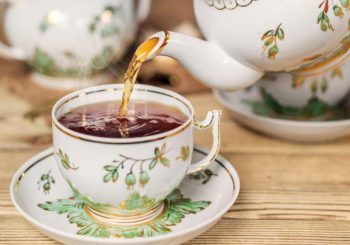Contributing writer for Wake Up World
There are many well-documented medical benefits to tea consumption but during coronavirus shutdowns, the psychological benefits of a scheduled “tea time” with family are also significant. In the U.K., “afternoon tea,” traditionally served in the family room or garden, and “high tea,” traditionally served after work at the dining table, are part of the nation’s psyche.1
But now, during the shutdowns caused by COVID-19, tea rituals have become even more important in the U.K. because of their comforting familiarity. CNN observes tea may be gaining an edge elsewhere too.2 According to the Food and Agriculture Organization of the United Nations, milk, fruit juices and soda are becoming less popular drinks, giving tea a boost.3
Tea drinking is also rising in the U.S. and sometimes dubbed “quarantea.”4 While you might think the places where tea consumption is most popular are China or the U.K., the top tea-drinking country is actually Turkey, where people drink an astounding 6.96 pounds of the beverage annually.5
In addition to the heavy tea-drinking countries of the Middle East and the U.K., the seventh biggest tea drinking country is New Zealand.6 What are some of the reasons this drink is so popular, especially during the COVID-19 pandemic in which some refer to it as quarantea?7
Tea Can Relieve Depression
A likely and understandable outcome among those whose lives have been cut off from their friends, schools, jobs, interests and plans by COVID-19 shutdowns is depression. A Gallup Poll in 2014 found that about 12.4% of Americans who were unemployed had depression or were being treated for it.8 When the unemployment became long-term, 27 weeks or more, the number grew to 18%.9
In May 2020 after weeks of the highest unemployment rates in history due to coronavirus, a whopping one-third of Americans were showing signs of clinical anxiety or depression, The New York Times reported.10 Nearly half said the shutdown was harming their mental health — and a 1,000% increase in calls to a national hotline center over the year before is testament to the angst and despair so many are feeling.11
Luckily, tea has been found in scientific studies to reduce or relieve depression without resorting to dangerous and harsh antidepressant drugs. According to The New York Times:12
“Tea has been associated with a lower risk of depression. A 2015 meta-analysis of 11 studies with almost 23,000 participants found that for every three cups of tea consumed per day, the relative risk of depression decreased 37 percent.”13
Research in the journal BMC Geriatric conducted in 2019 found:14
“… consistent and frequent tea-drinking was associated with significantly less depressive symptoms, and such impact was partially mediated by socioeconomic status, health behavior, physical health, cognitive function, and social engagement.”
The research found that the tea-drinking benefits were mainly seen in elderly Chinese people and it concluded:15
“Consistent and frequent tea-drinking may effectively reduce the risk of depressive symptoms for the Chinese elderly. The promotion of the traditional lifestyle of tea drinking could be a cost-effective way towards healthy aging for China.”
Depression-Relieving Mechanisms Identified
Are the depression-relieving mechanisms that are believed to come from tea-drinking due to its caffeine content? If so, tea would represent the same benefits seen with coffee and other caffeine-rich drinks. According to research in the journal Nutrients, substances other than caffeine may explain tea’s mood and emotional actions:16
“Oral administration of green tea polyphenol for 7 days significantly reduced immobility in a mouse model of depression, suggesting that this polyphenol has antidepressant-like effects.
Green tea polyphenols also reduced corticosterone and adrenocorticotropic hormone levels [in mice] thus reducing maladaptive responses to stress by inhibiting the hypothalamic–pituitary–adrenal axis. Stress is well known to be one of the most important factors responsible for depressive disorders.”
A study in the journal Pharmacological Research found a similar mechanism in mice:17
“Green tea polyphenols significantly reduced immobility in both the FST [forced swimming test] and TST [tail suspension test] but did not alter locomotor activity in the open field test, suggesting that GTP [green tea polyphenols] has antidepressant-like effects, and this action did not induce nonspecific motor changes in mice.
Green tea polyphenols also reduced serum corticosterone and ACTH levels in mice exposed to the FST. The present study demonstrated that GTP exerts antidepressant-like effects in a mouse behavioral models of depression, and the mechanism may involve inhibition of the hypothalamic-pituitary-adrenal axis.”
Tea Lessens Anxiety and Improves Cognition
The COVID-19 pandemic has caused multitudes to lose their jobs, their incomes, their career and educational aspirations and, for some, even their homes. It is no surprise that many are now suffering negative psychological effects like post-traumatic stress symptoms, anxiety, confusion and anger.
According to research in The Lancet in March 2020, 34% of 2,760 horse owners quarantined due to an equine influenza outbreak in 2007 to 2008 in Australia exhibited high psychological distress, compared with around 12% of non-quarantined people.18
Green tea may reduce such negative psychological states like anxiety and improve cognition. According to a meta-analysis in the journal Phytomedicine:19
“The reviewed studies presented evidence that green tea influences psychopathological symptoms (e.g. reduction of anxiety), cognition (e.g. benefits in memory and attention) and brain function (e.g. activation of working memory seen in functional MRI).”
The positive cognitive effects of tea are especially important for the elderly, who may be facing both quarantine-like situations and cognitive challenges. While the beneficial effects could come from the relaxing context in which the tea is consumed — preparing the brew, using a favorite cup and sitting down to enjoy a break from the world’s troubles20 — they also likely have a physical base. According to the journal Phytomedicine:21
“The effects of green tea cannot be attributed to a single constituent of the beverage. This is exemplified in the finding that beneficial green tea effects on cognition are observed under the combined influence of both caffeine and l-theanine, whereas separate administration of either substance was found to have a lesser impact.”
There Are Many Health Benefits From Drinking Tea
Even during stable times when you do not need a “quarantea,” tea offers a multitude of benefits. You do not need to be confused about the different types of tea either.
Black, white, green, oolong and pu’erh teas all come from the Camelia sinensis plant and only differ in how the leaves are dried and prepared. For example, for black tea, the leaves are allowed to oxidize in which the enzymes react with oxygen. Green tea leaves, however, are not oxidized but steamed and pan-fried right after drying.
While green tea extract allows you to consume higher amounts of EGCG (the plant compound epigallocatechin gallate) than you would get from drinking tea, other benefits from green tea are impressive. It may:
- Improve heart, liver and brain health, bone mineral density and weight control and support healthy blood pressure22
- Reduce oxidative stress23
- Support exercise performance, exercise recovery and enhancement of antioxidant protection24
According to the Journal of Indian Society of Periodontology, green tea may also have positive effects on:25
| Weight loss — EGCG prevents the breakdown of norepinephrine thus causing a rise in metabolism. |
| Antiaging — Antioxidants in green tea protect the skin from the harmful effects of free radicals, which cause wrinkling and skin aging. |
| Immunity — Polyphenols and flavonoids found in green tea help boost your immune system. |
| Cardiovascular disease — Green tea helps prevent heart disease and stroke. |
| Liver disease — Men who drink more than 10 cups of green tea per day are less likely to develop disorders of the liver. |
| Cancer — EGCG has been shown to inhibit angiogenesis of tumor cells by stopping the production of angiogenic compounds. |
| Arthritis — Green tea can help prevent and reduce the risk of rheumatoid arthritis. |
| Diabetes — Green tea improves lipid and glucose metabolism, prevents sudden increase in blood sugar levels and balances your metabolic rate. |
| Alzheimer’s — EGCG decreases production of beta-amyloid, a protein that forms the plaques that clog the brains of Alzheimer’s victims. |
| Parkinson’s — Antioxidants in green tea help prevent against cell damage in the brain, which could cause Parkinson’s, and thus help prevent it. |
| Cold and flu — EGCG, a powerful catechin antioxidant found in green and white teas, can directly kill bacteria and viruses. |
| Asthma — Theophylline in green tea relaxes the muscles that support the bronchial tubes, reducing the severity of asthma. |
| Stress — L-theanine, which is a kind of amino acid in green tea, can help to relieve stress and anxiety. |
| Food poisoning — Catechin found in green tea can kill bacteria that causes food poisoning and kills the toxins produced by those bacteria. |
| Human immunodeficiency virus — With human immunodeficiency virus (HIV), the EGCG acts as a block to the HIV transport protein on the host cell. |
| Dental caries — The effects of green tea extract on caries inhibition in hamsters and on acid resistance of human tooth enamel have been suggested by both in vivo and in vitro studies. |
| Periodontal health — The inhibitory effects of catechin contained in green tea on periodontal pathogens may provide the basis for beneficial effect of daily intake of green tea on periodontal health. |
| Halitosis — Halitosis is caused mainly by volatile sulfur compounds such as H2S and CH3SH produced in the oral cavity. Tea polyphenols have been shown to have antimicrobial and deodorant effects. |
Tea Reduces Inflammation and May Fight Cancer
Scientific studies have found that ingredients in tea can reduce inflammation and plaque formation. According to the Harvard Heart Letter:26
“‘Tea is a good source of compounds known as catechins and epicatechins, which are thought to be responsible for tea’s beneficial health effects,’ says Dr. Howard Sesso, associate professor of medicine at Harvard Medical School and associate epidemiologist at Brigham and Women’s Hospital.
These compounds belong to a group of plant chemicals called flavonoids. Research suggests that flavonoids help quell inflammation, and that in turn may reduce plaque buildup inside arteries. Green tea has slightly higher amounts of these chemicals than black tea.”
Green tea may also help to fight prostate cancer, the second most frequently diagnosed cancer in men. In one study of prostate cancer (PCa), the journal Medicine, Baltimore, wrote:27
“[T]here was a trend of reduced incidence of PCa with each 1 cup/day increase of green tea … Our novel data demonstrated that higher green tea consumption was linearly reduced PCa risk with more than 7 cups/day and green tea catechins were effective for preventing PCa.”
Green tea also may be a tool against liver cancer. A 2017 meta-analysis in the journal Nutrition and Cancer found a significant inverse dose-response association between green tea drinking and liver cancer risk.28 That inverse association increased with years of green tea drinking and when four cups a day of green tea were consumed. According to the journal:29
“We also found a trend that the incidence of liver cancer was reduced with the increasing years of green tea intake (significance at >20 yr). A significant dose-response association was found between green tea drinking and liver cancer risk.
The downward trend was most obvious when the consumption of green tea increased up to about 4 cups/day. The results showed that the increasing green tea intake may have a preventive effect against liver cancer.”
There is no precedent for this worldwide pandemic and people don’t know when it will end and may fear getting sick. No one knows what the world will be like when the crisis is over and governments and public health organizations offer slim views into the future. Quarantea, with its appealing, soothing taste and many health benefits, is surely useful during the COVID-19 pandemic.
References:
- 1 The Spruce Eats December 5, 2019
- 2, 4, 7, 20 CNN May 21, 2020
- 3 Food and Agriculture Organization of the United Nations May 17-20, 2018 V. Consumption 11
- 5, 6 World Atlas 2020
- 8, 9 Gallup June 9, 2014
- 10 The Washington Post May 26, 2020
- 11 The Washington Post May 4, 2020
- 12 New York Times October 5, 2015
- 13 Aust N Z J Psychiatry. 2015 Apr;49(4):334-45. doi: 10.1177/0004867414567759. Epub 2015 Feb 5
- 14, 15 BMC Geriatric 19, Article number: 246 (2019)
- 16 Nutrients 2018, 10(9), 1201
- 17 Pharmacological Research 2012 Jan;65(1):74-80
- 18 The Lancet Volume 395, Issue 10227, P 912-920
- 19, 21 Phytomedicine 2017 Oct 15;34:26
- 22 Journal of the American College of Nutrition Volume 25, 2006 – Issue 2
- 23 Critical Reviews in Food Science and Nutrition: Vol 60, No 10 . 2003;43(1):89-143
- 24 Nutrition Research 2011 Nov;31(11):813-21
- 25 Journal of Indian Society of Periodontology 2012 Apr-Jun; 16(2): 161–167
- 26 Harvard Heart Letter June, 2015
- 27 Medicine (Baltimore) 2017 Mar;96(13):e6426
- 28, 29 Nutrition and Cancer Feb-Mar 2017;69(2):211-220
Originally published at mercola.com and reproduced here with permission.
Recommended articles by Dr. Joseph Mercola:
- High Blood Pressure Linked to Increased Risk of Dementia
- Cholesterol Does Not Cause Heart Disease
- CBD Has Unique Ability to Cross Blood-Brain Barrier
- Water and Homeopathy: Latest Discoveries at Science’s Cutting Edge
- Sugar Substitutes: What’s Safe and What’s Not
- Unveiling the Depths of the Human Psyche: Psychedelics May Unlock Parts of the Mind That Are Normally Inaccessible
- What Should Your Poop Look Like?
- The Endocannabinoid System and the Important Role it Plays in Human Health
- Magic Mushrooms May Hold Key to Long-Term Relief from Anxiety and Depression
- Scientific Links Between Processed Foods and Depression
About the author:
Born and raised in the inner city of Chicago, IL, Dr. Joseph Mercola is an osteopathic physician trained in both traditional and natural medicine. Board-certified in family medicine, Dr. Mercola served as the chairman of the family medicine department at St. Alexius Medical Center for five years, and in 2012 was granted fellowship status by the American College of Nutrition (ACN).
While in practice in the late 80s, Dr. Mercola realized the drugs he was prescribing to chronically ill patients were not working. By the early 90s, he began exploring the world of natural medicine, and soon changed the way he practiced medicine.
In 1997 Dr. Mercola founded Mercola.com, which is now routinely among the top 10 health sites on the internet. His passion is to transform the traditional medical paradigm in the United States. “The existing medical establishment is responsible for killing and permanently injuring millions of Americans… You want practical health solutions without the hype, and that’s what I offer.”
Visit Mercola.com for more information, or read Dr. Mercola’s full bio and resumé here.

If you've ever found value in our articles, we'd greatly appreciate your support by purchasing Mindful Meditation Techniques for Kids - A Practical Guide for Adults to Empower Kids with the Gift of Inner Peace and Resilience for Life.
In the spirit of mindfulness, we encourage you to choose the paperback version. Delve into its pages away from screen glare and notifications, allowing yourself to fully immerse in the transformative practices within. The physical book enriches the learning process and serves as a tangible commitment to mindfulness, easily shared among family and friends.
Over the past few years, Wake Up World has faced significant online censorship, impacting our financial ability to stay online. Instead of soliciting donations, we're exploring win-win solutions with our readers to remain financially viable. Moving into book publishing, we hope to secure ongoing funds to continue our mission. With over 8,500 articles published in the past 13 years, we are committed to keeping our content free and accessible to everyone, without resorting to a paywall.








